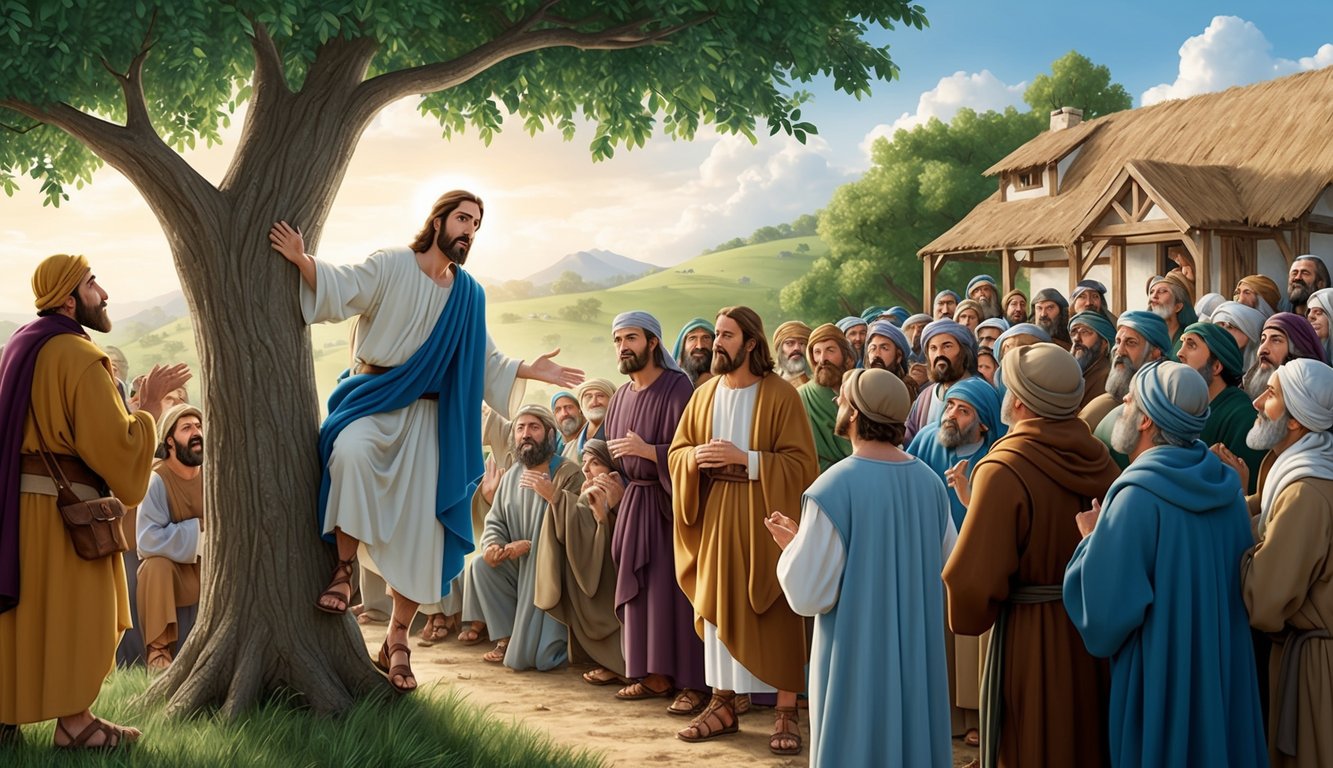Don’t Miss Out On This Unique Astrological Opportunity
Are you tired of spinning your wheels and getting nowhere? Simply put, you’re out of sync: you’re out of alignment with your astral configuration.
But: there’s a kind of map that can help you reclaim your alignment. Think of it as your own personal blueprint to success and happiness: a blueprint that will help you live your most amazing life.
Get started here.
The story of Zacchaeus, found in Luke 19:1-10, is a compelling narrative that holds valuable lessons about personal change and the power of compassion.
In this passage, Jesus visits Jericho, encountering a man named Zacchaeus, who has gained wealth as a tax collector. Despite being seen as a sinner, Zacchaeus is determined to see Jesus, leading to a life-changing experience.
Imagine someone considered an outcast in society, yet eager to connect with something greater.
Zacchaeus’s encounter with Jesus isn’t just a chance meeting; it results in genuine transformation.
Through this story, you can explore how moments of openness and kindness can lead to profound change, not just for one person, but for an entire community.
This biblical account provides a beautiful example of how identity and salvation can intertwine.
As you dive deeper into this story, you’ll discover how Zacchaeus’s decision to climb a tree in anticipation set the stage for a new beginning.
Key Takeaways
- Zacchaeus seeks out Jesus amidst societal rejection.
- Jesus’s compassion leads to Zacchaeus’s transformation.
- This story highlights the connection between identity and salvation.
The Context in Jericho
Jericho was an ancient city rich in history and culture, providing a unique setting for the story of Zacchaeus.
Understanding the backdrop of Jericho helps you appreciate the narrative and Zacchaeus’s role as a tax collector in this period.
Historical Background of Jericho
Jericho is one of the oldest cities in the world, known as “the city of palm-trees.” It is located about six miles from the Jordan River and fifteen miles from Jerusalem.
The city’s historical and biblical significance is notable.
After being conquered by Joshua, a curse was placed on its reconstruction, which Hiel later defied during King Ahab’s reign.
Over time, Jericho developed into a prosperous and bustling location, due to its strategic position and resources.
It was significant in trade and agriculture.
The wealth of Jericho made it an attractive location for many, including Roman officials and Jewish leaders.
Zacchaeus and His Profession
Zacchaeus held the position of chief tax collector in Jericho, giving him authority and influence over other tax collectors.
Being a tax collector, especially a chief one, was not popular among the Jewish people.
Taxes were collected for the Roman Empire, and collectors were often seen as collaborators with the enemy.
Despite his wealth, Zacchaeus faced alienation because of his job.
His profession involved managing tax collections and likely profiting from them, which earned him resentment from his fellow Jews.
Encountering Jesus brought changes to Zacchaeus’s view of his work and interactions with the community surrounding him.
Encounter with Jesus
In Luke 19:1-10, you learn about a special meeting between Jesus and Zacchaeus.
Zacchaeus was a wealthy tax collector who wanted to see Jesus.
His reaction when he meets Jesus, and how he responds to being welcomed as a guest, shows what true change looks like.
The Meeting beneath the Sycamore Tree
When you find yourself among a crowd, it can be hard to get a good view.
Zacchaeus faced this challenge because he was short.
Despite this, he desperately wanted to see Jesus.
Zacchaeus climbed a sycamore-fig tree to get above the crowd.
This tree was an unusual choice, but it provided the perfect vantage point.
His actions show his determination to encounter Jesus, no matter the obstacles.
By doing this, he stood out, which set the stage for Jesus to notice him directly.
Zacchaeus’ Response to Jesus’ Call
Imagine being called out in a crowd by someone important.
That’s what happened to Zacchaeus.
Jesus passed beneath the tree and called out to Zacchaeus by name.
This unexpected invitation took everyone by surprise.
Jesus wanted to meet him at his house.
Zacchaeus’s response was joyful and immediate.
He didn’t hesitate or question; instead, he welcomed Jesus with open arms.
His eagerness demonstrates how you might respond to a meaningful call, highlighting the joy of being accepted without judgment.
Reception of Jesus as Guest
Having Jesus as a guest was an honor that many would cherish.
Zacchaeus welcomed Jesus into his home warmly.
The presence of Jesus transformed his home into a place of acceptance and change.
Zacchaeus promised to make things right by giving back what he had wrongly taken.
This is a powerful moment that shows the true impact of Jesus on Zacchaeus’s life.
Here, you see the transformation possible through encounter and acceptance.
Inviting Jesus in changed Zacchaeus, giving him a new purpose and direction.
This meeting shows the importance of hospitality and the willingness to change when faced with truth and kindness.
Transformation and Restitution

Zacchaeus offers a powerful story of change.
His interactions with Jesus lead him to make significant commitments, focusing both on sharing his wealth and making amends for past wrongs.
Zacchaeus’ Pledge of Wealth Redistribution
When Zacchaeus meets Jesus, he makes a bold pledge.
He decides to give away half of his possessions to the poor.
This is a big change for Zacchaeus, who was known to be very rich.
By promising a large redistribution of his wealth, he shows a new commitment to justice and caring for others.
Zacchaeus’ decision to share his wealth is more than just a gesture.
It marks a change in his heart and priorities.
Before, wealth defined much of his life, but now it becomes a tool for doing good.
His decision reflects the depth of his transformation and the impact of his encounter with Jesus.
Acts of Repentance and Paying Back
Zacchaeus also focuses on acts of repentance.
He promises to pay back four times anyone he has cheated.
This gesture highlights his desire to correct past wrongs.
His commitment to restitution shows real change and responsibility for his actions.
By promising to repay those he’s defrauded, Zacchaeus emphasizes fairness and integrity.
He doesn’t just say sorry; he takes action to repair the damage.
This approach sets an example of accountability.
It demonstrates not just a change of heart but also a dedication to doing right by those he has wronged.
Salvation and Identity

In Luke 19:1-10, the story of Zacchaeus highlights themes of salvation and identity.
First, Jesus proclaims salvation to Zacchaeus, demonstrating what it means to be “lost” and “found”.
His declaration of Zacchaeus as a son of Abraham reinforces the importance of spiritual lineage.
Furthermore, this passage underscores the mission of the Son of Man to seek and save those who are lost.
Jesus’ Proclamation of Salvation
In this passage, Jesus openly declares salvation for Zacchaeus.
After meeting Zacchaeus, a rich tax collector often seen as a sinner, Jesus states that salvation has come to his house.
Through this proclamation, Jesus illustrates a profound message: no one is beyond redemption.
Zacchaeus’ eagerness to meet Jesus shows his willingness to change.
His actions, like offering to give half his wealth to the poor, indicate genuine repentance.
By confirming salvation for Zacchaeus, Jesus also emphasizes the power of faith and transformation.
In His acceptance, Zacchaeus finds a new identity as part of God’s family.
Link to Abraham’s Lineage
Jesus refers to Zacchaeus as a “son of Abraham,” linking him to a rich spiritual heritage.
This remark underscores the idea that salvation is not restricted by social status or past mistakes.
Being a son of Abraham signifies inclusion and acceptance into God’s promise.
In Jewish tradition, being a descendant of Abraham means being part of the chosen people.
Jesus extends this identity to Zacchaeus, a societal outcast.
This act reaffirms that everyone, irrespective of their past, can be embraced.
It’s a message of hope for those who feel marginalized or unworthy.
Mission of the Son of Man
The mission of the Son of Man, as stated by Jesus, is to seek and save those who are lost.
By choosing to stay with Zacchaeus, who was labeled a sinner, Jesus exemplifies His purpose.
He reaches out to those society overlooks, focusing on transformation rather than condemnation.
This mission challenges you to see beyond surface judgments.
The story is a reminder that the lost can be found through love and acceptance.
It encourages you to embrace the true mission, to seek and assist those striving for a new life.
Through this mission, Jesus provides a path to spiritual fulfillment.
Frequently Asked Questions

In Luke 19:1-10, the encounter between Jesus and Zacchaeus offers deep insights into themes such as redemption, grace, and transformation.
Explore its significance and how it fits into the Gospel of Luke’s message.
This passage highlights Jesus’ mission to seek and save the lost, demonstrating that no one is beyond the reach of God’s grace.
Zacchaeus’ transformation from a corrupt tax collector to a repentant follower underscores the power of divine love in changing lives.
Similarly, understanding the John 20 scripture meaning illuminates themes of faith and resurrection, reinforcing the message of salvation found throughout the Gospel of Luke.
What is the significance of the story of Zacchaeus in Luke 19:1-10?
The story is important as it portrays Jesus reaching out to those considered outcasts.
Zacchaeus is a chief tax collector, and his meeting with Jesus shows that no one is beyond redemption.
This meeting changes his life, highlighting the accessibility of Jesus to everyone, regardless of past actions or social status.
How is the theme of redemption portrayed in the encounter between Jesus and Zacchaeus?
Redemption is shown through Jesus seeking Zacchaeus, who many disliked due to his job.
Jesus invites himself to Zacchaeus’s house.
This act of kindness and acceptance leads Zacchaeus to repent and change his ways.
It reflects how Jesus offers redemption to those willing to change.
What does the interaction between Jesus and Zacchaeus teach us about grace?
Jesus’s interaction with Zacchaeus demonstrates that grace is given freely and unexpectedly.
Zacchaeus does not seek Jesus to earn favor.
Instead, Jesus reaches out to him first.
This shows that grace is not about being deserving; it’s about open-hearted acceptance and transformation.
Why was Zacchaeus’s response to meeting Jesus important in the context of Luke 19:1-10?
Zacchaeus’s response is crucial because it exemplifies genuine repentance and willingness to change.
He promises to give back what he has wrongfully taken and to help the poor.
His actions show that meeting Jesus ignites a desire for fairness and kindness in his life.
What can we learn from the story of Zacchaeus about repentance and transformation?
You learn that true repentance comes with a desire to make amends and transform one’s life.
Zacchaeus doesn’t just feel guilty; he takes action to correct his wrongs.
This transformation is powerful, demonstrating that encountering Jesus can lead to profound personal change.
How does the narrative of Zacchaeus in Luke 19:1-10 fit into the overall message of the Gospel of Luke?
The Gospel of Luke often highlights Jesus’s outreach to the marginalized and sinners.
The story of Zacchaeus aligns with this theme, showing Jesus’s mission to save the lost.
It emphasizes Jesus’s acceptance and love for everyone, reinforcing the message of hope and salvation.



